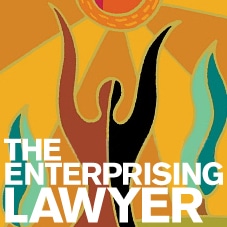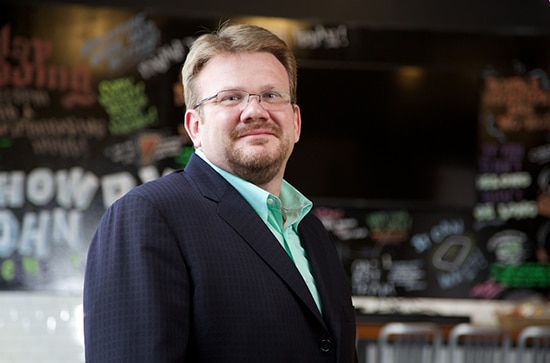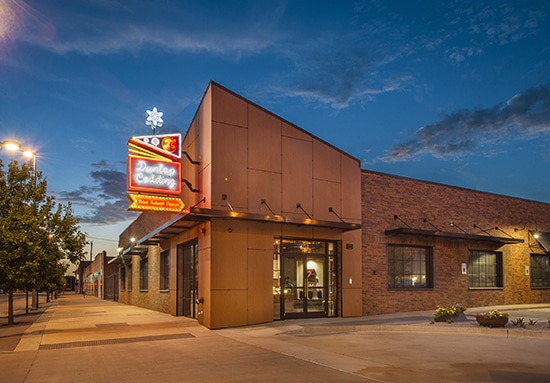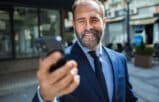Who are these “enterprising lawyers”? Actually, they are easy to spot. Look for the more engaged and happier lawyers in the crowd. Deeply invested in the power of the work they do for their clients, they have ample interests beyond the practice of law as well. And they seem to have more energy for getting things done than anyone in the crowd. You probably know one or two — you may even be one yourself!
Meet Douglas Sorocco, partner with Dunlap Codding, PC, in Oklahoma City. When Douglas spotted a 100-year-old warehouse in the city’s old “skid row,” he saw more than a chance to design cool new office space. He saw opportunity, and potential in creating free event space. Now a gathering place for artists, innovators and fundraisers of all stripes, the IP firm is building a thriving community around “DC on Film Row.”
Douglas Sorocco
Dunlap Codding, PC
Oklahoma City
University of Dayton, J.D., 1996
Butler University, B.S., 1993 (Chemistry)
What exactly is “DC on Film Row”?
DC on Film Row is a free event space open to everyone in our community. We like to say it is a “home for creatives and innovators, home builders and the homeless, celebrators and the celebrated,” so people understand that we are inclusive and want everyone throughout our community using our space. Our goal is to celebrate the incredible diversity of creativity, innovation and passion within Oklahoma City, and to provide a venue — free of charge — to those groups and individuals working to bind us together and make our home a cooler and better place. No strings attached — no extensive rules to follow. We simply ask that all of our neighbors be honored and all viewpoints be respected. Our criteria for use is simple: If the event, group or meeting is something that strengthens our community and brings us all together, the space is available for use.
Where did the idea come from?
I had been thinking about ideas revolving around the dual concepts of “space” and community “place-making” since visiting the Catalyst Ranch in Chicago about 10 years ago. I wanted a space that was cool and edgy, but would still allow people to mold and make it their own, depending on their objectives. I had looked at many older buildings and commercial spaces around downtown Oklahoma City, but had never found the ideal solution. When the firm’s lease was coming up, we decided to purchase a nearly 100-year-old warehouse in an area of town previously known as “skid row,” which had been getting attention as a possible area for creatives and entrepreneurs to relocate. The area oozed potential, and we took a leap of faith.
When planning the space, we knew we needed a kitchen and gathering area for everyone, because we have lunch brought into our office every day for our employees. A large commercial garage door stood smack in the middle of the area we were considering for the kitchen. It made me think about all of the restaurants and clubs on the West Coast that use glass garage doors to open the interior space to the outside. Once that idea came — the rest began to flood into place: If we were opening to the outside, we needed a deck. If we needed a deck, we needed a landscape that was inviting to guests — we needed trees, we needed an arbor to define the space and provide anchor points for shade sails, we needed, we needed, we needed.
In the end, I proposed tearing up part of a secondary parking lot, turning the area into an exterior event space that opened up into our kitchen area via the glass garage door.
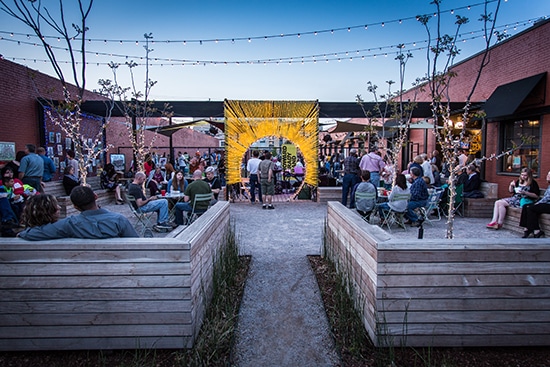
Altogether, we have around 3,000 square feet that can be used to meet the needs of varying sizes of groups.
Do you see this as a marketing activity?
Maybe. (How’s that for a lawyer answer?) I acknowledge that the firm is becoming better known throughout the community. We’ve made new friends from all walks of life and generated new clients as a result of the activities. I am loathe to label it as marketing, however, because it seems to add a layer of cynicism to the concept. Our goal has always been to do what is “right,” and I worry that if we think about the space primarily as a marketing activity we might miss an opportunity to help a group in the community.
Describe some of the groups that have used the space and how it has impacted your firm.
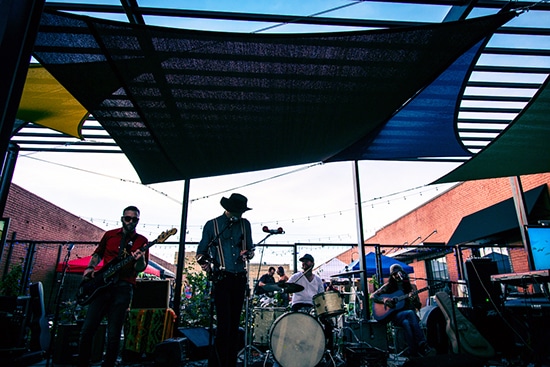
Every Wednesday at lunchtime, we invite a local food truck to set up outside our gates, and welcome our downtown neighbors into the space for a bit of socialization. In October, we turn the space into a haunted house and invite the neighborhood children to trick-or-treat. There is something happening all the time.
I believe that the impact on our firm, and the karma we have been blessed with, is greater than anything we have put out into the world. We have engaged our community and they have made us feel welcomed. Our employees have opened their hearts and wallets to the people who use our space to raise funds for charitable purposes.
More than anything, the process of running and participating in the space has been the best “team building” exercise you could imagine. It provides an opportunity for everyone to be engaged — if you don’t like music but painting is your thing, wait a couple of days and we have an art show coming up. If you like to help feed the homeless but don’t like chatting up the chamber of commerce, you have an opportunity to be involved. Everyone pitches in and volunteers their time where they think it can make a difference.
Describe Dunlap Codding’s practice.
We are a boutique intellectual property law firm with about 23 professionals (lawyers, Ph.D. patent agents and technical experts). We concentrate on legal issues involving technology, creativity and innovation. Our practice integrates IP asset development and acquisition with enforcement through litigation, licensing and governmental agency action. We’ve been blessed with having a deep pool of technical talent in Oklahoma City and the other markets in which we operate. Many of our professionals have advanced science and engineering degrees or real-world corporate experience in chemical engineering, biochemistry and molecular biology, computer sciences and electrical engineering, for example. Our front-line IP acquisition attorneys average almost 20 years of experience and engage with clients on substantive legal issues every day.
More than 75 percent of our revenue is generated from clients and projects outside our region, and clients based overseas comprise a significant part of our current growth. Needless to say, we spend a lot of time traveling, as it is a bedrock principle of the firm that better legal outcomes are achieved when you are knee-to-knee or eye-to-eye with a client. We absorb the cost of such travel into our “cost of doing business” — we don’t believe in passing on to our clients the cost of where we choose to live.
Many lawyers have good ideas but struggle to bring them to reality. To what do you credit your success with this?
People and the support of those around me. I’ve been extremely fortunate to have mentors in my life who allowed me to run with my “crazy ideas” and never beat me up if an idea didn’t quite get off the ground. My partners are incredibly flexible, accommodating and willing to provide constructive advice and support — they are truly a little sister and two older brothers. I’ve always preferred to surround myself with people who are smarter and more motivated than me to accomplish great things. I’ve been lucky so far that they haven’t figured out that all of the cool and innovative things we are doing are really because of them. (Although I guess I just let the cat out of the bag with this interview!)
Why did you want to be a lawyer?
Truthful answer? Because I didn’t want to be a chemist. I also have an absolute love for the arts. So being a lawyer allows me to use both sides of my brain to make a difference in the lives of people — whether an innovator with a new company, a musician with a new song to license, or even an individual temporarily homeless who simply needs a warm meal and a place to charge their phone for an hour.
As my Twitter handle says, “IP attorney by day. Crusading do-gooder by night.” I just need to get some theme music to go along with it and all will be complete.
What is the focus of your own law practice?
I consider myself a “technology attorney,” which means that I represent clients in transactions involving technology and intellectual property — including joint development projects, collaboration arrangements, IP licensing, and manufacturing, distribution and strategic sourcing agreements. I also have an active counseling practice with respect to IP protection strategies, innovation facilitation and product development. My practice also involves conducting diligence investigations and negotiating terms regarding IP ownership and technology dependencies in connection with internal IP audits, mergers and acquisitions, public offerings and other strategic transactions.
I also often act as “outsourced general counsel” for technology and start-up companies. I believe I am a business-oriented attorney, as I frequently assist clients in establishing the core business terms of a deal in addition to advising on IP rights allocation, licensing terms, warranties, indemnities and the like. My passion is in assisting clients in creating new business models and entering markets with a competitive position based on technology and innovation. My client base includes multinational companies as well as start-ups.
Who was your most important mentor and what did that person teach you?
Charles “Skip” Codding was either the sole or majority owner of the firm for the first 11 years of my practice in Oklahoma City. He had a strong sense of how to treat people — professionals don’t have to be micromanaged, you treat everyone fairly and your primary goal as an owner is to make certain all of your employees are taken care of. Skip’s core philosophy was that an “owner” is a person who is paid last and takes responsibility first. He also taught me that you can be entrepreneurial in your law practice, and that it’s worth taking the risk to truly advise your clients, to be willing to take a position and offer what many perceive to be “business advice.”
What about practicing law did you learn the hard way?
That there is “the truth” on one side and on the other side is what you can prove, and there may be very little overlap between those two things. As a young lawyer it was hard for me to realize that very few things in life are black and white. Once I was able to work within the “shades of gray” inherent in the law, I became a much less stressed person.
How would you describe the location and décor of your personal office?
I am a sentimentalist and love anything to do with the history of a place or the culture of the people I visited. One entire wall of my office is filled with floor-to-ceiling bookshelves that contain trinkets of visits, pictures of my family and things that I use to remind me of where I came from and where I need to go. My favorite thing is my grandfather’s derby hat that he wore every day when he went to work as a machinist. It reminds me that he got up every day to do what was best for his family without complaint. The message is to be humble and acknowledge that we are an amalgamation of those who came before us.
At the same time, I have a framed motto from the turn of the century by Elbert Hubbard that says, “Never explain — your friends don’t need it and your enemies won’t believe you anyway,” so I am not a saint.
Why would someone describe you as “enterprising”?
I have a habit of asking, “Why not?” I like to try things to see what happens and learn from the successes — but more from my failures. I would define enterprising as someone who can take bits and pieces of the best ideas from many different fields or areas of endeavor and mix them up and throw them out into the world.
I tend to get a little ahead of myself at times and find that I have a dozen projects happening at once. I think you need to have a little bit of untreated ADD in order to chase ideas and people and put them together to see what happens.
What is the first thing you “check” each morning?
Email, since many of my clients are overseas and already up and working. I then read The Dish blog run by Andrew Sullivan. While he occasionally writes about legal topics, the blog makes me think about issues differently and exposes me to the thoughts of people and sources I would never run across on my own. And then my son and I watch reruns of “Modern Family” while eating breakfast. It’s the “Brady Bunch” of his generation.
Where do you think the practice of law is going?
Personal and authentic. I don’t think it is possible anymore to set yourself up as someone who is a “lawyer during the week” and your “real self” during the evening and weekends. I encourage our younger attorneys to open up to our clients, to share something of themselves and their passions, and to engage people on a personal and emotional level. I think people can intuitively sense when someone is only pretending to care about their issue.
I recognize that not all clients want to have someone that gets to know their business and personal lives as well as their legal issues. Those, however, are also the clients that will only be looking at legal services as a commodity expense — a service that can be provided by anyone, anywhere, at the very lowest price. That is not the type of law I want to practice.
As a practical matter, I also believe that when the Millennial generation begins deciding corporate legal spend, concepts such as authenticity and sincerity will become the yardstick against which service differentiation is measured.
Where are you going?
Belgium. I am the Chair of the Commerce Committee for Creative Oklahoma, the only North American member of the International Districts of Creativity. I am leading a delegation to the Creativity World Forum in November. I’ve had the pleasure of seeking out applicants, selecting attendees, organizing travel plans, facilitating the design of an “edgy and hip” booth to represent Oklahoma and fundraising to cover the travel expenses of the group — all within the last seven weeks. It’s been a blast, but making this all happen with creatives and innovators is like the proverbial “herding cats”— but in this situation the cats have access to cool technology and swanky vocabulary. I am really looking forward to having a Belgian beer or two once the Forum has begun.
What are people most surprised to learn about you?
Probably that I think of myself as an “introverted extrovert.” I love working with people but I also crave being by myself in a quiet and out-of-the-way spot. Living in Oklahoma is a reflection of this as I prefer the smaller “big” where you have the ability to unwind from the world a bit and take a breather from the fast-paced international technology and legal marketplace. My wife teases me that I could become a hermit and live the rest of my life reading, traveling as a vagabond around the world and wasting too much time learning obscure information on the Internet. With two young kids, I certainly have pined for the life of a hermit at times.
What do you do every single day that you could actually go without doing?
I really don’t believe that there is anything I do that is … Hey, look! Did you see that huge spider? …. Okay, I have a lot of “Squirrel!” moments throughout the day. I’d be so much more productive wearing sound-minimizing headphones and working in a hermetically sealed room with white walls and floors.
What three things must you always have in your brief bag, desk drawer or refrigerator?
- First, wet wipes — I travel a lot and the world is a grimy place.
- Second, I have a pen fetish and collect pens while traveling. I have two entire drawers in my desk filled with pens, and more than 100 new and antique fountain pens. My current “indispensable” pen is the Stabilo Bionic Worker from Germany.
- Third, Red Vines licorice, the “best” junk food in the entire world.
Where do you turn when things go really badly?
Music. I played the trombone through college, worked as a DJ at a local radio station, and DJ’d parties. So I grew to have an appreciation for all types of music. (With the lone exception of country western!) Music is the one thing that can motivate me and make me forget.
More About Douglas Sorocco
Douglas J. Sorocco practices in the areas of intellectual property, technology, licensing, life sciences and patent law and is involved in counseling and transactional work involving all aspects of intellectual property. He is registered to practice before the United States Patent and Trademark Office. He is an adjunct faculty member at the Oklahoma City University School of Law and in the Physiology Department at the University of Oklahoma’s Health Sciences Center. Doug is also humbled and appreciative for his selection as Time Magazine’s 2006 Person of the Year.
Illustration ©ImageZoo.



